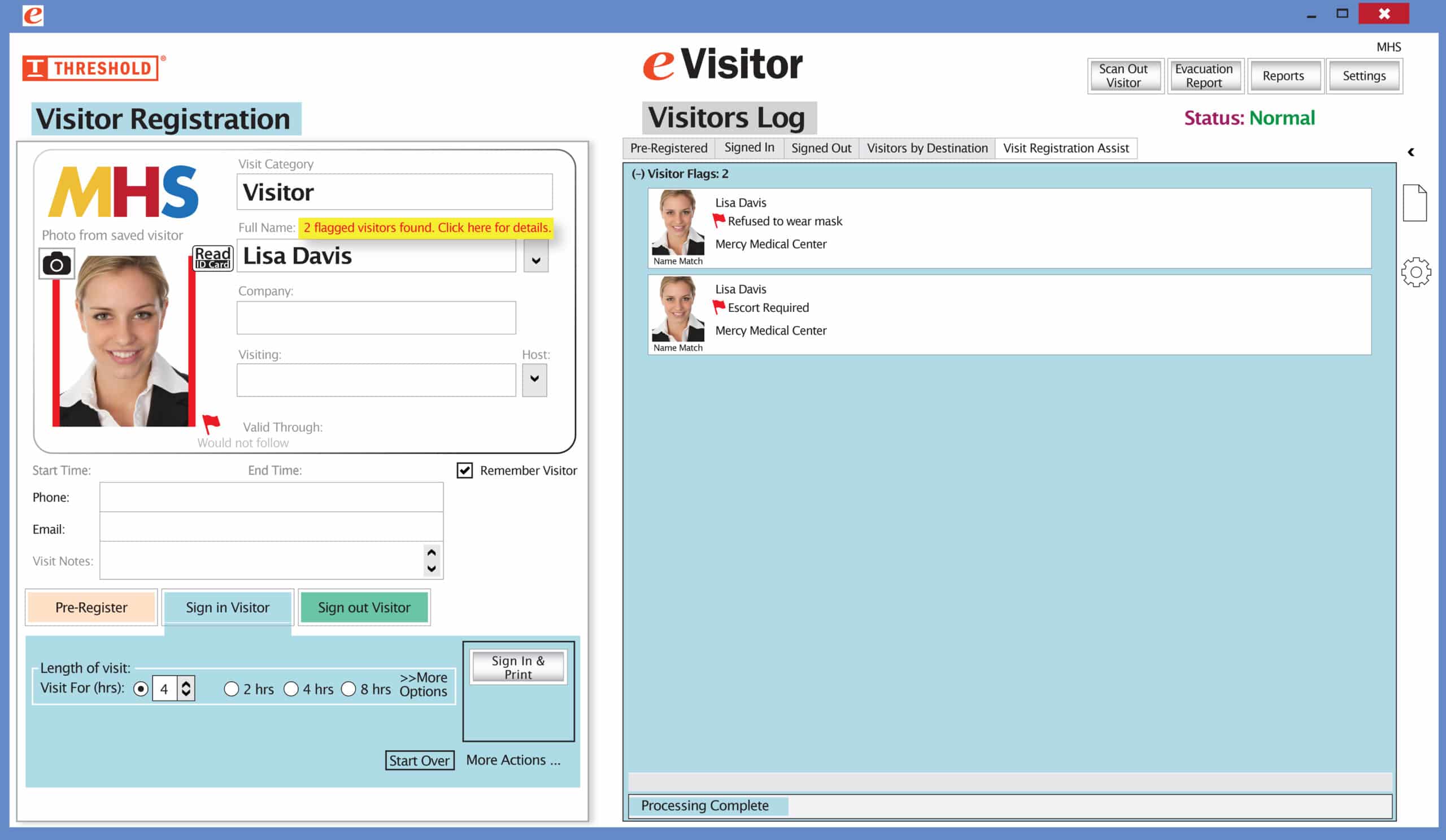Hospital staff members are devoted to providing safe, high-quality, compassionate care. That compassion and concern for the well being of their patients extends to visitors. Visits by relatives and friends are encouraged to make any patient’s stay more enjoyable, but hospitals must also have policies in place for keeping the healthcare facility secure. See our list below of nine visitor policy basics to help keep a hospital secure.
1. Document visitor traffic using visitor management software.
Visitor management software (VMS) is an electronic version of the visitor sign-in sheet (or visitor log book) that has been used in facilities for years. While more expensive than a traditional logbook, visitor management software offers a more efficient and full-proof sign-in process. It is the most secure way to sign in visitors that come to your hospital and a very affordable way to improve the visitor management and security of your building(s). Visitor management software allows you to:
- Print visitor badges
- Know who is in the building at any day/time
- Provide a standard way to register visitors
- Improve your hospital’s bottom line
2. Choose how to identify visitors.
The electronic visitor management system mentioned above will provide your guests with a visitor badge to clearly identify them as such. Some visitor badges change color overnight to prevent reuse. These special visitor badges provide a visual alert to the security staff or employees that a person’s presence should be questioned. If your visitor doesn’t want to use the adhesive badge directly on their clothing, badge tags can be utilized in conjunction with a badge clip. Badge tags are laminated holders for the adhesive badge (some are even reusable).
3. Identify various kinds of visitors in a specific way.
Different kinds of visitors have different access to certain areas of the building and therefore may require different treatment and identification. Clearly identifying the type of visitor will allow anyone encountering that person to know if they are allowed to be in the area. Family, vendors, contractors, temporary workers, volunteers, and interns are all categories to consider, and it’s easy to label visitors as such.
4. Require all visitors to wear a visitor badge.
Hospitals should require all visitors to wear a visitor badge at all times while in the hospital. The badge should clearly display the visitor’s name, photo, and the department or room they are visiting. Printing professional-looking visitor badges that include critical information shows your facility cares about security. It is also a chance to promote your facility’s brand and prevent forgery that could happen if you used plain, non-imprinted visitor badges.
5. Communicate visitor policy content on your website.
A hospital website is the perfect place to communicate your visitor policy to the public. Such messages include:
- Visitor responsibilities – This includes everything from not visiting patients when the visitor doesn’t feel well to allowing hospital staff to do their jobs when a visitor is present in the room. See our list “How to visit someone in the hospital – 15 tips from nurses who know”.
- Directions for getting to the facility
- Where to park
- What entrance to use
- Regular visiting hours and after-hours policies
- In-facility cell phone policy
- Any pre-visit health screening procedures before being allowed access to the building
- How to reach a patient
- Special restrictions of certain high-risk departments such as the Emergency Department, Maternity, and NICU
- Guidelines for visiting with children
- Directions on where to get food within the facility
- Short- and long-term options for lodging
6. Make sure visitors are directed where to go.
Hospital visitors should be welcomed as long as their reason for being there is legitimate. Upon entering the facility and getting registered with a visitor management system, the visitor should be directed to the area/people that they are there to see. In addition to staff members being available to help, there should be signage that allows people to find their own way as well.
7. Train your staff about the office visitor policy/procedure.
Once you’ve created a hospital-wide visitor policy, it is imperative to train your staff. Training and periodic drills will ensure your security staff and other employees are familiar with and confident in the security policies in place. This training includes a clear set of guidelines that covers how employees are supposed to act. Topics include everything from what to do if they see an undocumented visitor to what to do if they see a fellow employee violating a visitor procedure.
8. Make visitors feel welcomed.
A lot of effort and planning goes into a security plan for what to do with individuals when they arrive on-site, but what about from the visitor’s point of view? Are visitors’ needs being addressed? Here are some ways to improve the experience of visitors when they come to your hospital and to answer their questions about what to do once they arrive:
- Create an inviting lobby with comfortable chairs, refreshments, and up-to-date reading materials for any wait time.
- Follow up after your visit to see if there are any areas of improvement for their visitor experience.
9. Have an emergency preparedness plan in place.
Develop an emergency preparedness plan that includes procedures for evacuating visitors in case of a security breach or emergency situation. While these events don’t happen often, having a plan in place will allow security personnel to react confidently to an incident instead of hesitating and wondering how to deal with the situation.
Our eVisitor Software can affordably increase your hospital security and help you always know who is in your building. eVisitor makes it easy for healthcare facilities to log, identify, track, and run reports on visitors. Watch this video to learn more, then request a free demo today!


